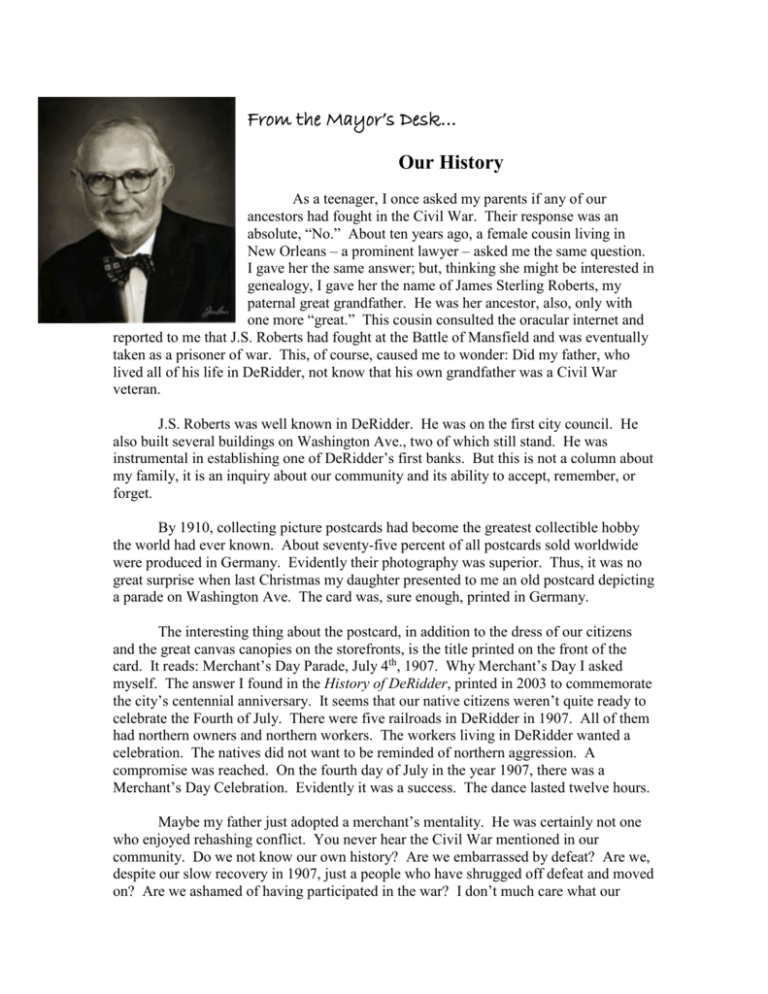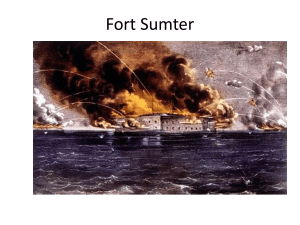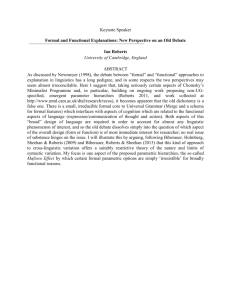Our Chief - City of DeRidder
advertisement

From the Mayor’s Desk… Our History As a teenager, I once asked my parents if any of our ancestors had fought in the Civil War. Their response was an absolute, “No.” About ten years ago, a female cousin living in New Orleans – a prominent lawyer – asked me the same question. I gave her the same answer; but, thinking she might be interested in genealogy, I gave her the name of James Sterling Roberts, my paternal great grandfather. He was her ancestor, also, only with one more “great.” This cousin consulted the oracular internet and reported to me that J.S. Roberts had fought at the Battle of Mansfield and was eventually taken as a prisoner of war. This, of course, caused me to wonder: Did my father, who lived all of his life in DeRidder, not know that his own grandfather was a Civil War veteran. J.S. Roberts was well known in DeRidder. He was on the first city council. He also built several buildings on Washington Ave., two of which still stand. He was instrumental in establishing one of DeRidder’s first banks. But this is not a column about my family, it is an inquiry about our community and its ability to accept, remember, or forget. By 1910, collecting picture postcards had become the greatest collectible hobby the world had ever known. About seventy-five percent of all postcards sold worldwide were produced in Germany. Evidently their photography was superior. Thus, it was no great surprise when last Christmas my daughter presented to me an old postcard depicting a parade on Washington Ave. The card was, sure enough, printed in Germany. The interesting thing about the postcard, in addition to the dress of our citizens and the great canvas canopies on the storefronts, is the title printed on the front of the card. It reads: Merchant’s Day Parade, July 4th, 1907. Why Merchant’s Day I asked myself. The answer I found in the History of DeRidder, printed in 2003 to commemorate the city’s centennial anniversary. It seems that our native citizens weren’t quite ready to celebrate the Fourth of July. There were five railroads in DeRidder in 1907. All of them had northern owners and northern workers. The workers living in DeRidder wanted a celebration. The natives did not want to be reminded of northern aggression. A compromise was reached. On the fourth day of July in the year 1907, there was a Merchant’s Day Celebration. Evidently it was a success. The dance lasted twelve hours. Maybe my father just adopted a merchant’s mentality. He was certainly not one who enjoyed rehashing conflict. You never hear the Civil War mentioned in our community. Do we not know our own history? Are we embarrassed by defeat? Are we, despite our slow recovery in 1907, just a people who have shrugged off defeat and moved on? Are we ashamed of having participated in the war? I don’t much care what our attitude is, I would just like to have a grasp of it. I believe our collective mentality, though it is difficult to describe, is our real strength. I don’t think we follow causes as a group. Haven’t heard much lately about the local Tea Party. It must be remembered, I suppose, that we live in Beauregard Parish, so-named for the illustrious general who opened the Civil War by firing on the Yankee-occupied Fort Sumpter. The name, however, was chosen by a local ladies club almost half a century after the war. General Beauregard never set foot in Southwest Louisiana. We did at one time have a bust of him in the foyer of our courthouse. A few years ago, someone collided with the bust and General Beauregard lost his nose. After rhinoplastic repair he retreated to a cubbyhole in the front corridor. There he resides with not so much as a name plate. There has been no outcry of espionage or protest in the street. Actually, Beauregard’s career decline was caused more by his own chain of command than by any battlefield screw up. The commanding office at Fort Sumpter had been, it should be noted, one of Beauregard’s professions at West Point. They remained friends for life. From his cranny in the courthouse corridor, General Beauregard commands no deference. He is not integral to our history. I think this is a good thing. We should honor our dead. This is beyond dispute. Let us accept that their actions were based upon their own code of honor. We can read about the past. We can get most of the facts straight. The tenor of the time is ephemeral. It is beyond us – behind us. In _____, the Daughters of the Confederacy placed a plaque on the grave of J.S. Roberts. He is buried in Woodlawn Cemetery, over on Bilbo Street. He is now a certified Confederate soldier. I was invited, prayed, pledged, and probably would have contributed. They took no offering to pay. They placed about a dozen plaques. I wish my father had been there. He had gone to his own reward by then. I would still like an explanation. Was he ignorant, ashamed, puzzled or maybe just forward looking?





